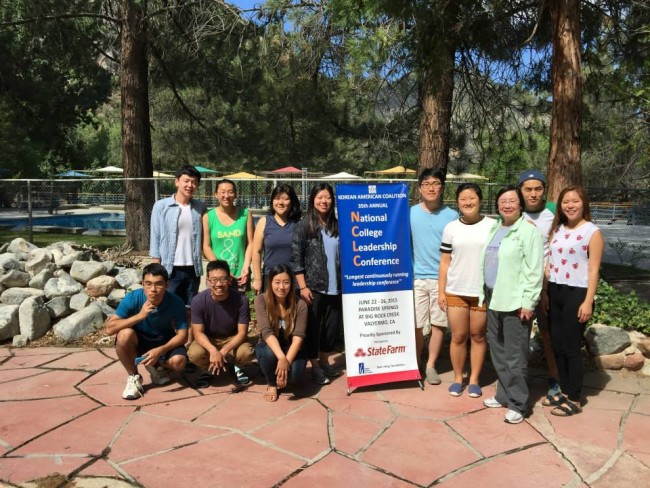An attendee of the 35th Annual Korean American Coalition College Leadership Conference reflects on her experience.
by JESSICA KWEN
jessica@charactermedia.com
Imagine this: a group of college students going to a secluded refuge in the Sierra National Forest for a five-day conference without knowing anything about each other. Seems a little strange and nerve-racking, no? That is how I felt at first as I stepped onto a bus with eight other students to attend Korean American Coalition’s 35th Annual National College Leadership Conference in Paradise Springs, Calif. this past June.
The retreat is the longest continuously running leadership conference for Korean Americans in the United States, with past attendees including such leaders as California State Assemblywoman Young Kim and Jim Yong Kim, World Bank President and former president of Dartmouth College.
As a rising junior, I wanted to attend this conference because it is difficult to find a network of Korean Americans passionate about the things I am at UC San Diego. I craved a space where fellow Korean American students and I could bond over the common interest of learning about our heritage, cultural identity and history of activism in this country. Little did I know how amazing an experience it would turn out to be: We met and heard from speakers such as the legendary Susan Ahn Cuddy and actor Ki Hong Lee; we formed lasting friendships with one another; and we learned to feel more confident with our Korean American identity—with the hopes of encouraging more students to seek out this once-in-a-lifetime opportunity.
The conference attendees came from such schools as Brown University, Soka University, UC Berkeley, Arizona State University, UC Riverside, Pomona College and Azusa Pacific University. We had differing career interests in fields such as law, international politics, finance, sports, theology and computer science. Regardless of the diversity in our majors, it was very cool to see that the unifying factor that brought everyone to the conference was a shared desire to equip ourselves with the leadership and advocacy skills to serve our community.
Throughout the week, in a campsite-type facility high up in the mountains, we met 13 phenomenal Korean Americans representing various professions, from an FBI agent to a Major League Baseball agent. Speakers such as Mayor of La Palma Peter Kim and Tad Yo, executive director of baseball operations–Asia at Boras Corporation, shared how they got to where they are and the obstacles they faced along the way. Others, such as Esther Lim, Grace Yoo and Phyllis Kim, respectively, spoke about social justice issues such as the civil rights of incarcerated individuals, the political consequences of redistricting L.A.’s Koreatown and the forced sexual slavery of thousands of Korean women in Japanese army camps during World War II.
 Conference attendees listen to actor Ki Hong Lee. (Photo by Steve Kang)
Conference attendees listen to actor Ki Hong Lee. (Photo by Steve Kang)
Meeting Ki Hong Lee, a rising Hollywood actor who had a prominent role in the 2014 blockbuster film, The Maze Runner, was one of the coolest yet weirdest experiences of the retreat for me. There we were, casually sitting on the grass in a circle by a famous celebrity underneath the shade of the forest trees. Did I secretly act like a fangirl underneath my poker face? Yes. Is Ki Hong my new obsession? Now he is, after I learned how down-to-earth and helpful he was to us.
As an International Studies major who’s thinking about going into the entertainment industry after college, I appreciated the wealth of knowledge Ki Hong shared with us about the state of Hollywood and the issues Asian American actors face. Citing the lack of many Asian Americans in mainstream entertainment, Ki Hong spoke about the importance of growing the ranks of people who can represent our community in a positive, real way—and also the need for strategically choosing roles that shift the way we are portrayed. For example, the actor said he loved playing Min Ho in The Maze Runner because it was a part that demonstrated that Asian men, too, can be masculine and strong.
When I asked how more Asian Americans can break into mainstream Hollywood, he replied, “Whether it is acting, writing or whatever you want to do in life, become so good at it that executives don’t have a choice but to hire you. Just as a person can’t become a body builder overnight, you have to practice at something little by little every single day. You have to master it. Then, people will remember your name.”
It was an inspiring message, and just one of many empowering ones I would hear that week from the lineup of speakers.
The highlight of the conference, however, was getting to meet and hear from Susan Ahn Cuddy, in what was her final public appearance before her passing at age 100 on June 24.
A daughter of Helen Ahn and Dosan Ahn Chang Ho, the Korean independence activist and co-writer of the South Korean national anthem, Susan was a trailblazer. During a time predating the U.S. Civil Rights movement and the push to include women in the labor force, she became the first Asian American woman in the U.S. Navy, the first woman gunnery officer and the first Asian American woman Naval Intelligence Officer. In the Navy, she played a role in helping to liberate Korea from Japanese imperialism and defending America during World War II. At the National Security Agency, Susan served as the department chief of the Central Reference section and supervised over 300 Russian code-breakers at the height of the Cold War. What an incredible person.
 The author Jessica Kwen with Susan Ahn Cuddy and her son Flip Cuddy. (Photo by Ara An)
The author Jessica Kwen with Susan Ahn Cuddy and her son Flip Cuddy. (Photo by Ara An)
At the conference, in a small meeting room, Susan sat in front of us in a wheelchair with her son Philip Cuddy by her side as they told us her remarkable life’s story. I was grateful and in awe that even at her age and frail health, she was more than happy to meet with and inspire a group of college students she had never met before. Her story of breaking one patriarchal and racial barrier after another is a testament to her courage and the unfathomable heights we younger Korean Americans can aspire to with resilience and hard work. In a frail and quiet voice, Susan told us, “To be a good leader…they are not going to look for you…you have to get it out of yourself.”
Philip Cuddy also advised us to become service-oriented leaders rather than just power-seeking individuals in order to form a strong relationship with the community. After this talk, I felt inspired to become unapologetically and fiercely persistent in my pursuits, regardless of how people may think of me because of my gender and ethnicity.
Two days later, while my fellow conference-goers and I sat around the campfire, Grace Yoo, former executive director of KAC and the director of the conference, broke the news that Susan had peacefully passed away in her sleep the day before. Every one of us was in shock and we sat in silence for a while as we reflected upon the time we had just spent with Susan. We were the last group of students she had visited and we felt honored to have witnessed the close of an era—but, by no means, the end of a legacy.
A week later, my fellow conference-goers and I attended Susan’s funeral service in Hollywood Hills. Five hundred people from the Korean American community and beyond packed the Hall of Liberty at Forest Lawn Memorial Park to pay their respects to the legend and honor her memory. Testimonials were shared by everyone from LA County Board of Supervisors member Mark Ridley-Thomas to Susan’s biographer John Cha to her grandson and close friends.
 KAC conference attendees with Susan Ahn Cuddy on June 22, two days before Cuddy’s passing at age 100. (Photo by Steve Kang)
KAC conference attendees with Susan Ahn Cuddy on June 22, two days before Cuddy’s passing at age 100. (Photo by Steve Kang)
Edward Kim, a conference attendee from Azusa Pacific University who spoke at Susan’s funeral, later told me, “To see this amazing woman who changed history, it was a blessing. I can never forget her impactful speech about how thankful she was that she was to be part of us. Her humble spirit will always be remembered.”
My time at KAC’s National College Leadership Conference was, so far, the best week of my life. Every moment was precious and it felt like a dream to meet my peers, with whom I bonded while eating roasted sweet potato and s’mores around the campfire. I also am extremely grateful to the speakers who sacrificed several hours of their day to come to the campsite to empower us.
Before the KAC conference, I admit I was feeling a bit lost trying to figure out who I am while navigating through this pre-professional stage of my life with little guidance or vision. Now, I feel a newfound sense of purpose to become a community-oriented leader, just like all the speakers I met who had become pioneers in their fields and paved the way for future generations.
Since the conference, some of my peers and I have been meeting up every Monday in the KAC office to plan the launch of a community voting advocacy project, after noticing that very few Korean Americans vote in local and national affairs. Our aim is to change those statistics by encouraging more Korean Americans to register to vote and voice their needs through civic engagement.
Hopefully, my efforts to get involved in the community do not stop with the voting registration campaign. I hope to take what I learned at the conference and continue to get involved with community-oriented work well into the future. Thanks, KAC, for a memorable and worthwhile experience.
See Also
Commentary: A Medical Mission to North Korea
___
Featured image by Steve Kang
Jessica Kwen, a rising junior at UC-San Diego, is a marketing intern for KoreAm. To apply for the Korean American Coalition’s 2016 Annual National College Leadership Conference, click here.







